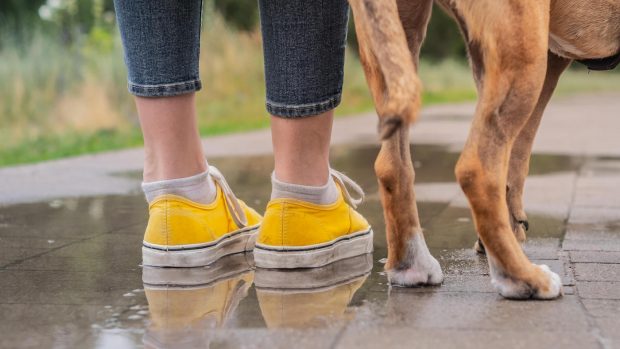In all the years I have been a behaviourist and trainer, not one owner has ever said their dog has never dug and just like working out how to stop a dog chewing, one question lots of dog owners as is how to stop a dog digging in the garden. The definition of digging may vary from shifting more earth than you ever thought possible in minutes, to nudging leaves and blankets to hide things. These are all forms of the same behaviour, albeit for different reasons.
Digging is a natural behaviour so we must start early in teaching our dogs, when and where to dig, and to leave it at the first opportunity. We can enrich our dogs from the outset by putting into place areas and equipment that they can exhibit natural behaviours while staying safe and having fun.
Why do dogs dig?
Digging is a natural behaviour – whether it’s making a den to live in in the wild or digging up their bedding and shifting it about in the domestic environment.
New smells
Sometimes if they’re digging in your garden, it’s often as simple as investigating disturbed soil or the scent of freshly planted flowers. A lot of owners complain they have freshly planted their borders and their dogs have very kindly unplanted them. This is because the soil is fresh and has been disturbed and dug over by you and something new put in it. This garners the dog’s attention and the new freshly planted flower that wasn’t there before, isn’t there when you return either. It could also be the smell of another animal, hedgehog, rabbit or fox – and your dog is digging to see if that animal is hidden further down.
Seeking shelter and comfort
Dogs dig to make a cool shelter in hot weather as well as in wind and rain. They can also dig for comfort and a need to feel protected – and this is often the case if they dig near building foundations, large trees or a water source.
Boredom
Digging can alleviate boredom and lots of dogs I’ve worked with like to hide their favourite toys or treats. My Irish terriers past and present have all done it and still do. They have lots of little stash spots all around the land so that others can’t find their treasure. Some dogs dig as they are on the hunt – and there are a lot of breeds that were bred to go underground to catch prey.
Stress and anxiety
It can also be a form of displacement behaviour if they are stressed or nervous, the same way a frustrated or over excited dog may do. I try not to be precious about my teaching area but the puppies love to have a good dig. I politely ask the owners to stop them and redirect, but I know that to the puppies this is one huge enrichment sandpit and it’s great fun – they don’t know how much it cost to build!
Separation anxiety is another reason that dogs may dig. If you’ve left your dog somewhere, they may try to break out to find you – whether it’s at home or somewhere new.
Escape
I call some dogs “purposeful diggers” – and by this I mean the escape artist. If there are lots of holes appearing around the fence line, it doesn’t mean your dog can’t bear being at home. It’s usually because they have seen or smelt something tempting them the other side. It’s most common in unneutered males who have a high desire to roam and perhaps visit the nice female in heat that he can smell a few streets away. During their heat cycle, female dogs are also more likely to exhibit the same behaviour. A dog with a high prey/chase drive may also do this, especially if a neighbour has chickens or you back on to livestock.
How to stop a dog digging in the garden
You can’t prevent your dog from digging completely, but you can teach them where to dig. You can use repellents and limiting the area in which to dig until they have been trained to dig a specific patch.
Prevention
A good deterrent is to sprinkle or spray something disgusting as it’s often the smell of something appealing that can start them digging in the first place. One of the best deterrents I’ve found is red cayenne pepper (which you can buy in larger quantities on Amazon). Sprinkle it around their go-to digging spots and you’ll know it’s been effective as your dog will likely snort and run away. I only use this for the most determined “dig-o-holics”. I like to start with something a bit milder, such as citronella spray (dog-specific version available on Amazon), coffee granules or you can even bury your dog’s poo where he digs.
You can block off the areas he’s been digging with fencing (like this from Amazon) or create a digging barrier. I have placed bricks over the areas before as well as nailing in chicken wire over the top of the area. Spend some time outside with your dog and if they start digging make a loud noise or bang two metal bowls together. The moment they lift their heads, redirect them with the “find it” game or a toy. Just like sheep-proofing, if you make the dog associate his digging with a noise he dislikes or that startles him, he is less likely to continue the behaviour.
Redirecting
All of these are very negative ways of dealing with the problem, so I always tell clients to either train the dog to go to an area of the garden they can dig or to purchase a children’s sand pit (like this one on Amazon). I then suggest they begin with simple methods of burying the dogs favourite toy or a kong with food in. Take them to the area and let them do their thing, when they start digging and find their treasure, praise them and start the association process of digging here is fun, rewarding and it pleases you instead of the angry scowl he normally associates you with when you find him digging up the garden.
When digging becomes dangerous
Dogs can become very sick from eating too much compost as it may contain slug pellets and fertiliser. There are a lot of plants and bulbs that are poisonous to dogs, too, including lilies, daffodils, tulips azalea and ivy. Poisonous plants can cause drooling and vomiting, so never has the importance of teaching the “leave it” command to a dog in such scenarios been so important.
You might also like:

How to stop your dog chewing your home to shreds

Teeth off! The best sprays to stop dogs chewing

How to help an anxious dog

How to stop a dog barking at the fence

6 of the longest-lasting dog chews for dogs who need to keep busy

Subscribe to Horse & Hound magazine today – and enjoy unlimited website access all year round
Horse & Hound magazine, out every Thursday, is packed with all the latest news and reports, as well as interviews, specials, nostalgia, vet and training advice. Find how you can enjoy the magazine delivered to your door every week, plus options to upgrade your subscription to access our online service that brings you breaking news and reports as well as other benefits.




